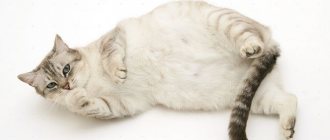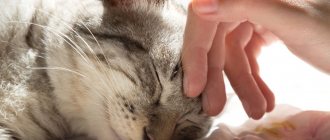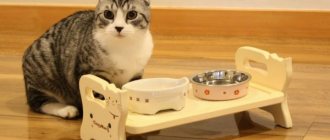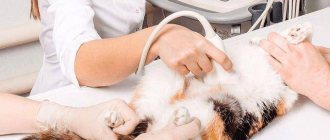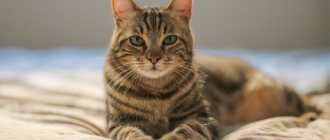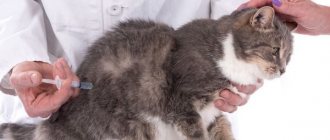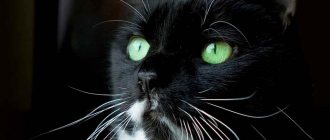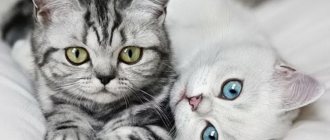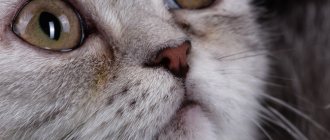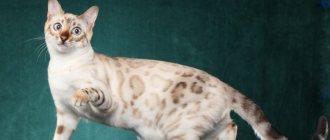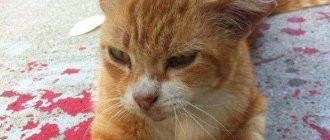The cat constantly sleeps and is lethargic: normal or pathological
Long rest and lack of appetite to a certain extent are normal. If the cat has had a heavy dinner, he becomes drowsy. The normal duration of rest per day is 12-14 hours or more.
The cat does not have sweat glands, and cooling through an open mouth is not typical. Therefore, in hot weather, the pet protects itself from overheating by reducing muscle activity, and also stops consuming calories through food. A fruitful mating has a calming effect on the female, and she prefers to sleep.
At the beginning of pregnancy, a cat, like a woman, experiences toxicosis while the signs are still invisible. Protection against illness is fasting and sleep. In older pets and individuals with a phlegmatic psyche, idleness and poor appetite are normal.
The norm is considered to be drug-induced inhibition after taking sedatives or antihistamines, as well as the condition after surgery.
The cat owner should be alert to additional symptoms:
- the desire to hide in a dark corner;
- the pet stops licking itself or does it too often;
- diarrhea and (or) vomiting develops;
- shortness of breath, cough, discharge from the nose or eyes occurs;
- muscle tremors appear;
- increase in body temperature or drop below normal;
- gums lose color.
Be sure to read:
Why does a cat have blood from under its tail: is it flowing or dripping, what should the owner do, should he worry?
If fasting and lethargy continue for more than two days, you need to see a veterinarian. Lack of appetite accompanied by cessation of drinking is a dangerous symptom.
Why does the kitten refuse to eat?
Diseases
If a baby at the age of 2-3 months suddenly stops eating, becomes weak, lethargic, breathes heavily, and there is also an increase in temperature and nasal discharge, most likely an infection has entered the body, causing such symptoms. In such a situation, with proper treatment, appetite will normalize within two to three days. If this does not happen, the kitten weakens and gets worse; most likely, the disease is of a different nature. It will not be possible to find out the reasons for the deterioration on your own; the baby needs to be urgently taken to the veterinarian. Common diseases in which the kitten eats little or refuses food altogether:
The cat is lethargic and sleeps all the time: what is the reason?
Among the pathological causes of lethargy are the following:
- poisoning,
- hormonal disorders after childbirth or as a result of using contraceptives,
- side effects of corticosteroid anti-inflammatory drugs,
- musculoskeletal pathologies,
- infectious diseases,
- worms;
- anemia;
- hypovitaminosis;
- tumors;
- chronic diseases.
Stress causes ambivalence in cats. The pet may become sleepy or, conversely, show aggression.
If your cat begins to eat little due to kidney failure
There are two types of kidney failure in cats - acute and chronic, which are characterized by refusal to eat. There is severe emaciation of the animal, frequent vomiting and urination, as well as a constant feeling of thirst. A common cause of this condition may be poisoning from flowers of the lily family. The condition of acute renal failure can be treated with timely contact with an experienced veterinarian. Resuscitation facilities and prompt implementation of treatment procedures will help restore your pet’s health in the shortest possible time.
If the cat is lethargic, does not eat or drink: what to do?
If the animal does not eat or drink, then there is a reason that causes vomiting. If toxic substances appear in the gastrointestinal tract, the body gets rid of them, first of all, through diarrhea and vomiting. This scenario develops in case of poisoning or infectious diseases.
When the intestinal lumen is clogged with bones, hairballs, and helminth balls, there is only one way to get rid of poisons - through the mouth. An attempt to eat or drink something is stopped reflexively and vomiting occurs. Therefore, food and water intake is stopped.
When your pet is not eating or drinking and an appointment with the veterinarian is postponed, it is necessary to protect him from dehydration. The owner of the cat is able to independently inject him with Ringer-Locke solution or saline solution subcutaneously in unlimited quantities. Use syringes of 5 or 10 ml. After the injection, an accumulation of fluid is formed, which quickly resolves. Water should not be used for injection, it causes pain.
You should not treat your cat yourself. There is a high risk of compromising health and creating problems for the veterinarian during diagnosis.
A number of other reasons
There are several other factors why a cat does not eat anything and only drinks water.:
- wrong diet. Perhaps the cat simply does not like the food that the owner offers him. Change the dishes and look at the cat's reaction;
- stressful situations. When changing place of residence or owner, the cat may become confused and miss the old way of life. Usually such nostalgia lasts a day or two. Then everything passes, and the cat is drawn into a new life;
- insufficient hygiene of cat dishes or food. People wash dishes after every meal. It will also be unpleasant for the animal to eat food that has disappeared, covered with mold and ants, or from a dirty bowl that has not been washed for a long time. Wash the saucer and evaluate the result;
- changing the location of the bowl. Put the saucer back in its original place and check if this is the problem;
- manifestation of character. Sometimes cats are just spoiled and mischief for any reason. Be patient for a day or two. The cat will get tired of this, he will get hungry and stop showing off. The main thing is not to force the animal to eat. The pet must drink water at this time;
- seasonal changes. In the summer, the cat refuses to eat, since food generates heat from inside the pet, which will be very unnecessary at that time of year. For three days, a cat can eat almost nothing, guided by its own well-being and instincts. The only salvation for the animal during this period is to drink water;
- fasting day. When an animal has eaten too much, it may not eat for the next few days, resting from meals;
- fur accumulated in the intestines. This may cause vomiting and constipation. Buy anti-hair medications for your cat at the pharmacy.
- beginning of sexual activity. The cat does not eat anything, but only drinks water, since she has only suitors on her mind, and cats have only continuous searches for their loved ones. This period of active life lasts several days. Then everything goes away;
Important! Pay attention to the age of the cat. If a young animal does not eat, but only drinks, it will survive for a maximum of a week, depending on the condition of the cat’s body.
If this is a kitten, do not allow it to eat anything for more than a day. But during these days he must drink water.
© shutterstock
An old cat will lie down more, eat nothing, drink water - this way he will last a maximum of three days.
Causes of reactive pancreatitis in children
Unlike adults, children more often react to infections and inflammations by disrupting the functioning of the pancreas.
The most typical causes of reactive pancreatitis in children are1:
gross violation of diet; regular consumption of fatty and sweet foods, foods high in preservatives and dyes; long-term treatment with antibiotics; frequent ARVI, flu, colds; repeated infection with helminths; allergic reaction (to food or medicine); congenital pathologies of the gastrointestinal tract, contributing to the development of inflammation of the pancreas; stress, emotional overload.
Medical practice shows that the key causes of reactive pancreatitis in children are related to nutrition. Namely, with violation of his regime, introduction of harmful foods into the diet, and passion for fast food.
Products that can provoke reactive pancreatitis in children:
- fried foods (both vegetable and butter);
- fatty foods;
- smoked meats;
- spicy seasonings;
- fast food (burgers, chips, French fries, crackers);
- sweets with dyes and artificial additives;
- carbonated drinks;
- packaged juices.
The reason is character
All cats are picky eaters, but in some cats, due to their nature, food whims are more pronounced. A cat “with character” may not eat for more than a day due to new, unusual or tasteless food, resentment towards the owner, or a change of environment (moving to a dacha, to a new apartment). This behavior is typical for some breeds - British, Scottish fold, Sphynx.
Sooner or later, the cat will come to terms with changes in diet or environment and will begin to eat normally. It is only important that she does not stop drinking water. If a short fast does not cause significant harm to the pet’s body, then dehydration is very dangerous.
Cat doesn't eat well after sterilization
During the first 24 hours, a cat that has undergone a sterilization procedure may show no interest in food at all. However, if apathy towards food continues on the second and especially the third day, you should start to worry and urgently contact a veterinary clinic. Prolonged ignoring of food in this case can signal possible complications after surgery, metabolic disorders, gastrointestinal pathology, and even mental disorders. It is necessary to prevent malnutrition, diagnose the cause of food apathy and begin treatment.
What to do if a small kitten cannot eat and drink on its own?
It happens that a little purr is separated from its mother cat too early. Experienced breeders of purebred animals give the kitten to new owners no earlier than 3 months of age, when it already knows how to eat on its own and is accustomed to a certain food. If the kitten was taken away from the cat when it was very tiny or the baby was simply found on the street, it is likely that he simply has not yet eaten anything other than his mother’s milk. The baby doesn't know how to lap from a bowl. Moreover, he has no habit of drinking water.
Such a cat will have to be fed milk from a pipette or bottle with a nipple. Moreover, it is recommended to use a special cat's milk substitute. Then you can gradually teach the kitten to lap from the bowl and eat wet food. A good way is to offer the baby food from your hand, sometimes this helps kittens start eating new food.
Complete refusal to eat
Complete refusal to eat, reluctance to drink water, constant lethargy of a pet is a serious reason to consult a doctor. But sometimes such symptoms accompany severe stress.
In this case, the cat should not be disturbed for a couple of days; perhaps the animal just needs to be in peace and quiet. If the cat's condition does not change after some time, the visit to the clinic cannot be postponed, otherwise the animal may die.
Algorithm of the owner’s actions in case of complete refusal of food:
- Provide your pet with a comfortable, quiet resting place away from drafts.
- Place a bowl of clean water next to the bed.
- Organize regular ventilation of the room.
- Protect the cat from contact with household members and other pets.
- Monitor the condition carefully, and if the condition worsens, take it to a veterinarian.
Common Causes of Malnutrition
In most cases, malnutrition is associated with stress, age, or poor food quality. Sometimes kittens eat little due to health problems.
Bad feeling
Most often, a deterioration in appetite due to poor health is associated with factors such as:
- Vaccination period. After vaccinations, the body fights the introduced pathogen, which can lead to a lack of interest in food for 1-2 days.
- Infections. They can manifest themselves in the form of diarrhea, the presence of impurities in stool, cough, etc.
- Heat. In the summer, cats tend to eat less, as the body spends less energy on heating.
- Hormonal changes. Most often, a kitten begins to worry at 7-9 months during puberty.
- Diseases of internal organs. Dental pathologies, tumors, etc. can cause refusal to eat.
- Shedding. Long-haired cats and animals with thick fur coats are especially affected. Wool accumulates in the stomach and can cause vomiting or intestinal obstruction.
- Taking medications. Antibiotics often cause the condition to worsen.
- The period of estrus or sexual hunting. At this time, the reproductive instinct comes to the fore, so animals worry less about hunger.
- Intoxication. May be associated with the ingestion of chemicals into the body, internal diseases, poor-quality food, etc.
We suggest you read: How to wipe a cat’s eyes with increased lacrimation and acidification Sometimes cats are diagnosed with anorexia, but in most cases it is secondary and occurs as a consequence of another disease. Sometimes this condition can be observed in eating disorders.
In their natural environment, cats expend a lot of energy to catch small prey, so they always try to keep themselves full and eat a lot. Pets don't need to hunt, so they have poor portion control.
Cats are conservative and sensitive, so any changes or discomfort can cause the animal to refuse to eat. This happens due to stress. It can be provoked, for example, by moving. Changing family composition also affects the pet's well-being. Young kittens often do not eat well when they arrive at a new home. This phenomenon is temporary: the situation improves after 3-5 days.
The animal may not eat well if the room is not clean enough. Most often, this is observed in pets who are kept in enclosures and cages. They are unable to leave the area and contaminants accumulate, causing stress.
Reasons why a cat wants to eat grass
Scientists cannot agree on the reasons why cats eat grass. There are several versions on this matter.
1. The herb helps cleanse the intestines and stimulate its functioning. Thanks to the presence of fiber, the digestion process functions stably, and undigested food (grass) irritates the intestinal walls. It begins to actively contract and remove accumulated “garbage”, which accumulates in the form of wool and other random small elements.
It should be taken into account that in the wild, the normal functioning of the digestive system is ensured by cats eating fur and feathers along with the flesh of the prey, which are not digested and almost completely leave the animal’s body. Domestic cats lack this.
2. The herb acts as a laxative/astringent. What type of greens a cat should eat is determined by her own feelings.
3. The herb helps replenish the lack of fiber in the body and saturate it with folic acid. There are no such substances in the meat that makes up the main diet of predators. The need for them becomes especially noticeable during pregnancy, growth and development of the body.
Folic acid is involved in the formation of the circulatory system and helps strengthen the immune system. Cats choose a plant based on their instinctive needs. Herbal preferences can indicate a deficiency of a particular substance in an animal.
4. With grass, the cat receives vitamins and minerals when its body signals that there are insufficient quantities. A lack of vitamins and minerals affects the animal’s appearance (fur, claws) and general well-being.
5. Chewing grass gives pleasure to the cat and improves its mood. Perhaps she just likes the taste of young greens and their juice. At the same time, she can simply chew the grass without swallowing it.
It’s just that the feeling of hunger cannot be satisfied by eating grass: it is not digested in the cat’s stomach. It is impossible to say that a cat eats grass, but it would be more accurate to say that it supplements its diet with greens. If homemade food consists only of meat and cereals, then the pet clearly does not have enough nutrients in its diet.
What grass can a cat eat and what grass can it not?
You should know that not every grass is a cat’s friend; some plants can even harm its health. Harmful plants can be found not only on the street, but also on the windowsill at home.
Which plants are considered harmless?
1. The most favorite herb for cats is catnip, or catnip. The plant contains an essential oil with an attractive odor to the animal. Although the aroma excites the cat, eating catnip has a calming effect.
2. Schisandra is of interest to representatives of felines.
3. Some four-legged furry creatures like parsley. It contains a large number of different vitamins, including A, B, C.
4. Many people know the weakness of cats and cats to valerian. However, it can be addictive.
5. Pet stores sell kits with oat and wheat seeds. Their sprouts are juicy and tender, but only young shoots. Tall grass is already less useful, as it accumulates substances that are poisonous to cats.
6. Some animals prefer to chew lemon balm.
What plants are dangerous?
Coarse grass fibers can injure the cat's digestive tract and cause vomiting. Therefore, if it is possible to provide your cat with fiber in another form, for example by adding vegetables to the diet, then this would be the best choice.
Also, owners should be aware that there are plants that have a poisonous effect, which must be strictly excluded:
1. Azalea is dangerous due to the alkaloid it contains. Eating the plant causes swelling of the larynx and has a negative effect on the heart and nervous system. Once ingested by a cat, azalea can cause death.
2. Schefflera is also deadly - one of its leaves can stop an animal’s breathing.
3. Poison for cats – cyclamen growing in houses. Animals must not have access to this plant.
4. Chrysanthemum, which is popular among gardeners, although it poses less of a threat to a cat’s life, can also cause malaise and indigestion, manifested in vomiting and diarrhea.
5. Caladium is a plant whose juice can not only burn the mucous membranes, but also seriously disrupt the functioning of the kidneys.
The cause of poisoning can be lily of the valley, oleander, geranium, calendula, daffodils, tulips, etc.
Can a cat eat grass outside?
When walking your cat outside, you need to watch what grass it is trying to eat. In urban conditions, it is difficult for an animal to find a plant that is beneficial to its health; even the safest herb can cause poisoning.
Danger and harm lie in the ability of any plant to absorb various substances: in the city this is dust, dirt, exhaust gases, which, together with the grass, enter the cat’s body.
The soil on which grass grows is full of bacteria and viruses. Even a small amount of soil that penetrates the digestive tract of an animal can cause a lot of diseases. There may be helminth eggs on the leaves of the grass, which become the direct cause of parasites entering the animal’s body.
Cats sometimes eat grass indiscriminately, without choosing exactly the right plants. The thorns and sharp edges of weeds growing nearby can get into the mouth along with the succulent leaves, and this is a risk to the health of the animal.
